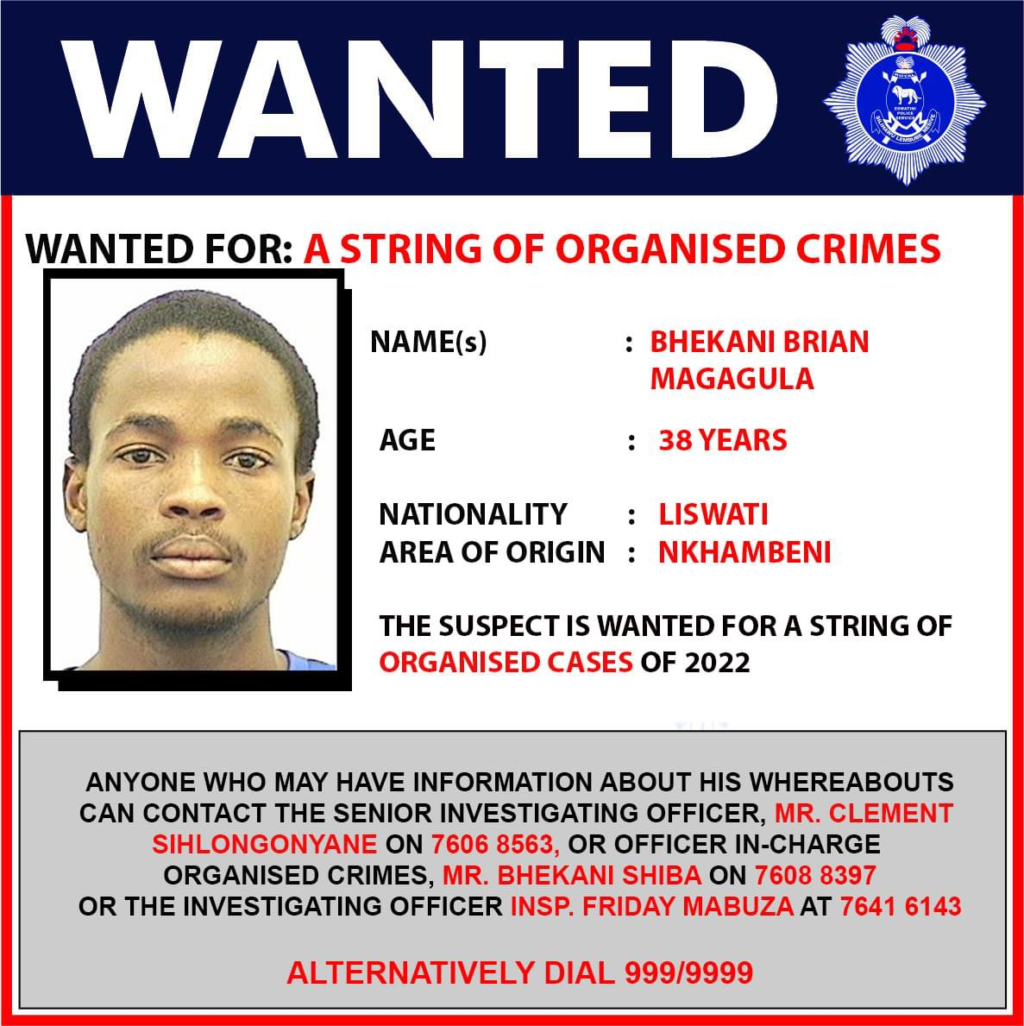ESWATINI POLICE BRAND EXILED POLITICAL ACTIVISTS AS CRIMINALS TO AVOID INTERNATIONAL SCRUTINY

King Mswati’s police have adopted a new strategy, branding wanted and exiled political activists as criminals in a bid to manipulate the International Criminal Police Organization (INTERPOL) and avoid international condemnation. This tactic seeks to discredit pro-democracy leaders and suppress resistance to the monarchy’s oppressive rule.
The police have issued notices alleging that these activists are wanted for “organized crimes,” but notably fail to specify the nature of the alleged offenses. Among those listed is Bheka Brian Magagula, a former Senior Correctional Services Officer who resigned to join the pro-democracy movement. Others targeted include Nhlanhla Mfanfikile Magongo of the People’s United Democratic Movement (PUDEMO), former warder Phakamani Magagula, Kenneth Ntokozo ‘Putin’ Vilakati, Nana Samson Sikhondze, Nimrod Simelane, Sonkhe Dube of the Swaziland Youth Congress (SWAYOCO), Vusi Innocent Nkambule, Mthunzi Mngometulu, Sifiso Mahlangu, and Hloniphani Mayibongwe, among others.
It is alleged that the police identified these individuals with the help of an insider, Mphumelelo Gina, a former Correctional Services officer who has reportedly been cooperating with the state. After several failed attempts to apprehend the activists in neighboring South Africa, the police reportedly resorted to branding them as criminals and appealing to the public for assistance in locating them.
Senior Superintendent Phindile Vilakati, the Police Spokesperson, declined to comment on the matter.
Eswatini remains one of the most repressive regimes in the world, where political parties are banned from participating in elections and human rights defenders, journalists, and activists face arrests, torture, or even assassination for advocating for democracy. The listing of political activists as wanted persons comes ahead of the June 29 massacre commemoration, a solemn event marking the brutal killing of dozens of civilians by Eswatini police and soldiers during peaceful protests in 2021.
Sources close to the matter revealed that the timing of these notices is likely aimed at discouraging activists from organizing or participating in events to commemorate the massacre. “Another reason they were listed as wanted is to discourage them from launching attacks as part of the June 29, 2021 massacre commemoration. Members of the public were urged to call the police upon seeing them,” one source explained.
This development underscores the monarchy’s continued use of fear and manipulation to suppress dissent and maintain control. By framing activists as criminals, the regime aims to delegitimize the pro-democracy movement and create obstacles for those advocating for reform. The strategy also seeks to deter international support for these activists by portraying them as threats to public safety rather than political dissidents.
Pro-democracy groups and human rights organizations have condemned this tactic, calling it a blatant attempt to undermine legitimate calls for democratic reforms. “Branding political activists as criminals is nothing more than an effort to silence those who dare to challenge the regime,” said a human rights defender who requested anonymity for safety reasons. “It’s a calculated move to divert attention from the real issue: the lack of democracy and human rights in Eswatini.”
As Eswatini approaches the anniversary of the June 29 massacre, the pro-democracy movement remains resolute in its demands for justice and reform. Activists have vowed to continue their fight, despite the growing risks and threats from the regime. For many, the struggle for democracy in Eswatini is a fight for dignity, freedom, and the future of the nation.
The international community is being urged to scrutinize the monarchy’s tactics and stand in solidarity with those advocating for democratic change. The persecution of political activists highlights the urgent need for global action to hold the Eswatini government accountable for its ongoing human rights violations. The voices of those silenced by oppression must not be forgotten, and their fight for a free and just Eswatini must be supported.



